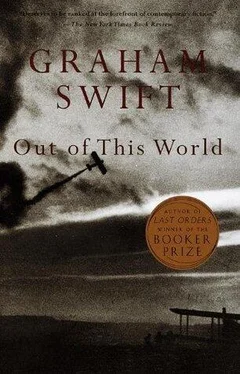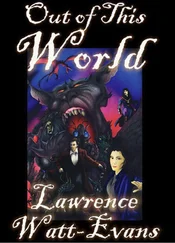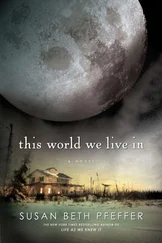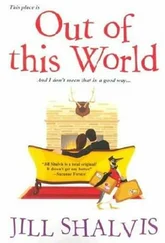Graham Swift - Out of This World
Здесь есть возможность читать онлайн «Graham Swift - Out of This World» весь текст электронной книги совершенно бесплатно (целиком полную версию без сокращений). В некоторых случаях можно слушать аудио, скачать через торрент в формате fb2 и присутствует краткое содержание. Год выпуска: 2012, Издательство: Vintage, Жанр: Современная проза, на английском языке. Описание произведения, (предисловие) а так же отзывы посетителей доступны на портале библиотеки ЛибКат.
- Название:Out of This World
- Автор:
- Издательство:Vintage
- Жанр:
- Год:2012
- ISBN:нет данных
- Рейтинг книги:3 / 5. Голосов: 1
-
Избранное:Добавить в избранное
- Отзывы:
-
Ваша оценка:
- 60
- 1
- 2
- 3
- 4
- 5
Out of This World: краткое содержание, описание и аннотация
Предлагаем к чтению аннотацию, описание, краткое содержание или предисловие (зависит от того, что написал сам автор книги «Out of This World»). Если вы не нашли необходимую информацию о книге — напишите в комментариях, мы постараемся отыскать её.
Out of This World — читать онлайн бесплатно полную книгу (весь текст) целиком
Ниже представлен текст книги, разбитый по страницам. Система сохранения места последней прочитанной страницы, позволяет с удобством читать онлайн бесплатно книгу «Out of This World», без необходимости каждый раз заново искать на чём Вы остановились. Поставьте закладку, и сможете в любой момент перейти на страницу, на которой закончили чтение.
Интервал:
Закладка:
Grandad went through his little act. Fetched a fresh bottle of champagne — as if we hadn’t been drinking the stuff all afternoon. But I guess he was happy then, too. I guess he was as happy as he was ever likely to be.
And there we were. All three Beeches, in the family house. Grandfather, father and daughter. Even two little unborn semi-Beeches, pretending to be one. That was the night of 23rd April, 1972. Springtime in England — St George’s day! And under the back seat of the Daimler there was a bomb, and nobody knew.
Harry
But he really died three times. He really had three turns with death. The second was in ’45, nearly thirty years after the first, and maybe it was the worst — and the best — of the three. The worst, because he knew, or thought he knew, what was happening: he was lying there on his back with death hovering over him and somewhere in the space he could see, too, whatever there had been of his life. And the best, because, after a certain point at least, he knew he wasn’t really going to die. It was the idea that was special. Since that first time, I think, he never cared two hoots about the fact. But he had time, now, to think of the idea. And it was the idea that gave him power. It was a trump card which he played for all it was worth.
Compassionate leave! Isn’t that the most grotesque of notions? You are up in the night sky, watching cities burn, planes and men get ripped, then your father has a heart attack and you get leave for compassion. The telegram reached me at two in the afternoon and the leave followed almost immediately. All that evening on the train down to London I was working hard at the compassion.
And he must have been working on the big death-bed scene. He was only forty-six, which was perhaps sure enough guarantee that he would pull through. But I had never thought of him as anything other than an old man, an old man who’d become an old man some time around the time of my birth. So it never occurred to me to treat the occasion as an extreme sort of hoax.
He lay propped against the pillows, in a private room, surrounded by the apparatus that they surrounded such patients with then. He was asleep. Or at least, his eyes were closed and his chest was heaving. I remember that his metal arm lay, detached, beside him on the bedside table. Like the sword of a dying knight. Either he or the hospital had decided that he should die without his armour. But it lay there, pathetically, beside him. And I remember feeling a stab of pity for that bereft arm that I did not feel for my father.
I said, ‘Dad?’ And he opened his eyes and recognized me, and said, ‘It’s you.’ We looked at each other. Then he said, ‘I haven’t much time.’ And when I heard those absurd words, like something out of a cheap play, I knew he wasn’t really going to die.
He didn’t want compassion and he didn’t want forgiveness. What he wanted was sworn promises. He wanted me to swear that I would take over at BMC. That when he was gone and the Air Force released me, I would fill his place. I said, as quietly as I could, that we had been through all this before. Besides, I knew now what I did want to do — the last few weeks had confirmed it: I wanted to be a photographer. I didn’t say witness, observer, neutral party, floating pair of eyes. He almost screamed at me: Photographer! And then he switched, as I knew he would, on to the loyalty and ingratitude tack. How it had been a family firm, a Beech firm, for seventy years etc., how he’d put his all into it etc. etc., and why did I think he was lying there stricken by a heart attack, if it wasn’t from overwork, from sheer damn hard work, six relentless years of wartime production. Breaking all records.
I watched his lips working, his jaw held up, his Adam’s apple moving up and down, knowing he knew that I knew that to cross him, to provoke him, under these circumstances, was effectively forbidden. I kept my voice as low as possible and said that whatever else there might be between us, there was a matter now of principle. I had seen a little of what bombs did, I didn’t think I wanted to spend my life making them. And he laughed at that, laughed out loud at that, and said how did I imagine we had won the war except by dropping bombs? Or did I think we shouldn’t have won it! And he called that kind of thinking ‘gutless’. Gutless.
The word seemed to leave him without breath. He just lay there, exhausted and helpless, only his eyes burning ferociously. Then he said those extraordinary words, so extraordinary that if they hadn’t been spoken so softly, so deliberately, I would have laughed out loud too. He said, ‘I love my country.’ And again: ‘I love my country.’
I don’t know if he really did believe at that moment that his time was up. Or whether it was all part of the tableau he was staging. The old campaigner’s fighting farewell. But just for an instant I thought his eyes were no longer fierce. They were saying: Harry, get me out of this, get me out of this person . As if his lips had been trying to utter something else, but what came out, with such perverse, measured sincerity, was ‘I love my country’.
I edged closer. I felt I should take his hand. I said quietly, ‘It’s all right.’ And as soon as he heard this, the fierceness came back, quick as lightning. ‘So do you promise?’ he said. ‘Do you promise?’
I said, ‘Don’t force me, Dad. Don’t blackmail me.’
He didn’t die, of course. The old bastard lived on, with occasional maintenance work on his heart, till he was seventy-three. And even then –
He said, ‘If you walk out of this room it’ll be the last time you see me. And if you walk out of this room without giving me your promise, you won’t get a thing. Not a damn thing. Do you hear? How much do you think a photographer makes? Eh? Eh?’
And I thought: He can’t actually change it. He can’t come out of it, cast it aside. Not even now. Not even when — He’s got to go through with it, sound off like some demented Victorian Papa. He’s played the part so long he doesn’t know any more if it’s him or not. I knew I was going to walk out of that room.
My God! My God, Jenny! My God, Sophie! How terrible to die, how terrible to be dying and not to know, at the end of it all, what is true or false.
Sophie
A toy gun in a Brooklyn yard. A toy gun in the land of guns. They won’t ever forget that day, will they, Doctor K? One of them brings home a toy gun — and it’s only a borrowed toy gun — and they’re playing shoot-outs in the backyard, and their mother who’s watching through the kitchen window suddenly flips, she goes right off her head.
Two things I’ve never allowed in the house. Toy guns (six-shooters, rifles, machine-guns or any form of toy weaponry). And cameras.
Joe said we shouldn’t have a thing about it. Maybe having a thing about it was worse. Because it was only natural for kids to play fight-games, and maybe it was actually better, getting it all out in a game, in harmless fun. And in any case, what was to stop them simply putting two fingers together and pointing — ‘using their imagination’ he called it! — and making those Krrrsh! Kpow! noises? And I said, well that was all very well and, yes, if every man who’d ever played with a toy gun actually progressed to the real thing, then the world would be a far sight bloodier than it is. But it didn’t mean every kid should have one. And if people say, well a toy is a toy, pretend is pretend and real is real, then what about those kids you see on the news with little old hard faces, only eleven or twelve but they’re dressed up in combat gear and they’re toting real machine-guns around the way other kids tote baseball bats. And what about this story — have you heard it? — it’s a true story. A man goes into a store and points a gun at the store-keeper and the store-keeper hands over all the cash he has. Then, befor he makes off, the man squirts water from the gun into the store-keeper’s face. Ha ha! he says, Not real, you see! But the store-keeper dies from a real enough heart attack.
Читать дальшеИнтервал:
Закладка:
Похожие книги на «Out of This World»
Представляем Вашему вниманию похожие книги на «Out of This World» списком для выбора. Мы отобрали схожую по названию и смыслу литературу в надежде предоставить читателям больше вариантов отыскать новые, интересные, ещё непрочитанные произведения.
Обсуждение, отзывы о книге «Out of This World» и просто собственные мнения читателей. Оставьте ваши комментарии, напишите, что Вы думаете о произведении, его смысле или главных героях. Укажите что конкретно понравилось, а что нет, и почему Вы так считаете.












